News of the day from select.Timeslive.co.za:
By Hannah Green
Continue reading at select.Timeslive.co.za.
By Admin
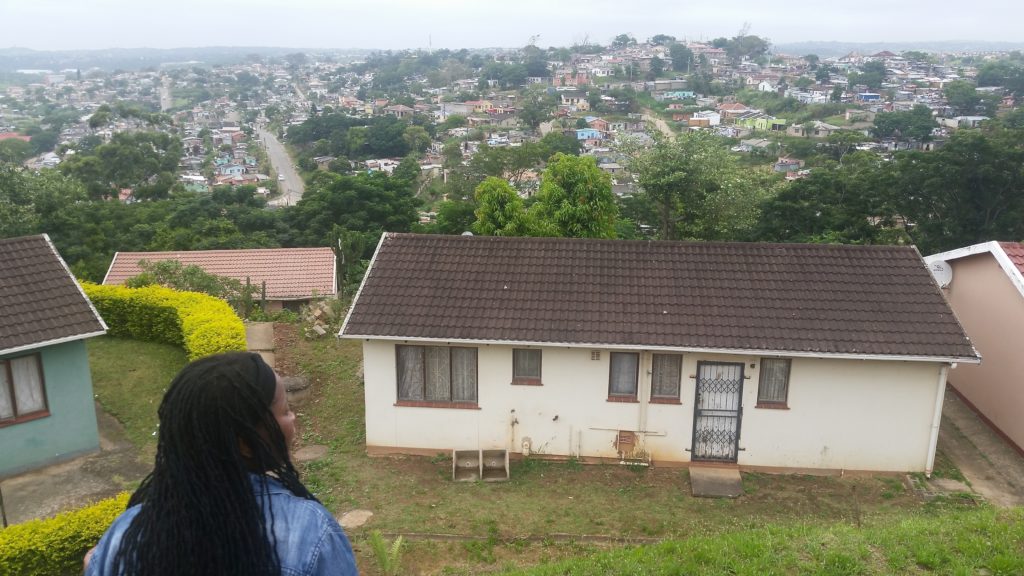
By Hannah Green
“For a municipality-built house, the home Nompilo Mkhize shares with her father and son in Durban’s Cato Manor is impressive.
The floors are tiled, the sitting room has a silver Samsung TV, and there is even a platter of fake wooden fruit decorating the coffee table. Mkhize’s father’s job as a driver for night-shift Prasa employees has treated them well.
South Africa is often described as a land of two nations, divided between a financially successful white minority and a large community of impoverished black Africans. But in Cato Manor the divide is not that simple…”
Continue reading at select.Timeslive.co.za.
By Admin
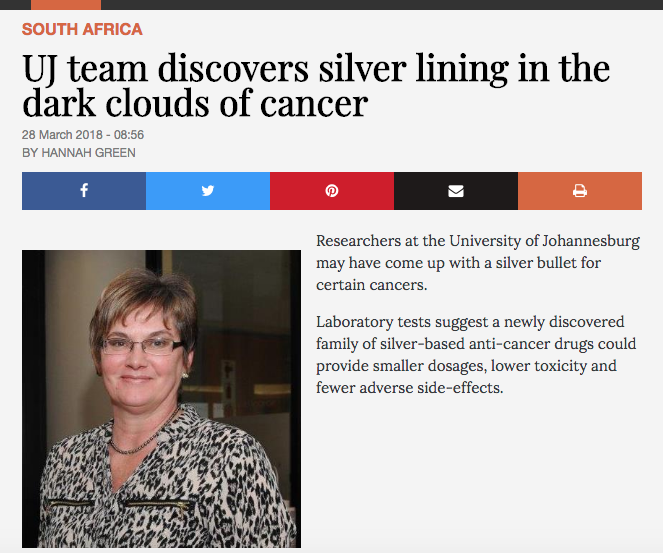
By Hannah Green
Researchers at the University of Johannesburg may have come up with a silver bullet for certain cancers.
Laboratory tests suggest a newly discovered family of silver-based anti-cancer drugs could provide smaller dosages‚ lower toxicity and fewer adverse side-effects.
Read more about their discovery at Timeslive.co.za.
By Admin
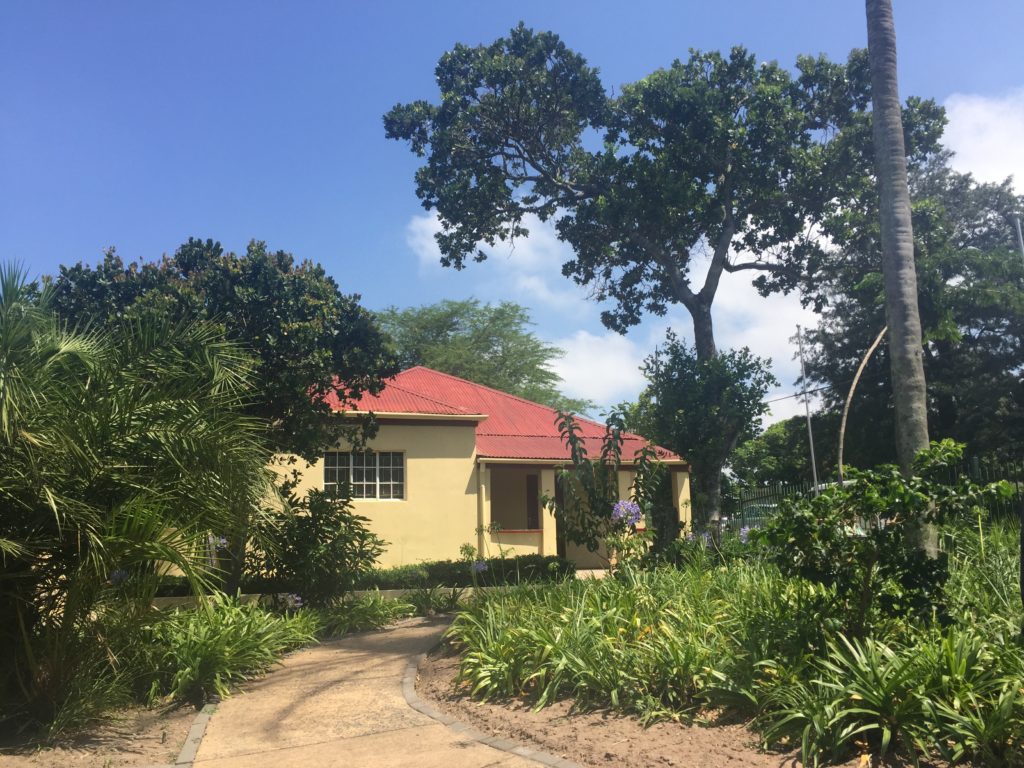
A visit to the Luthili Museum prompts a reflection on the history of the African National Congress (ANC) by preserving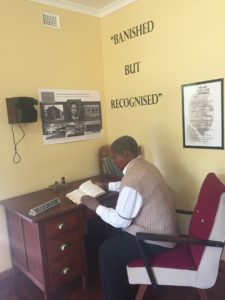 the legacy of its ninth president, Chief Albert John Mvumbi Luthuli. Chief Luthuli served as the ANC President from 1952-1967 and is celebrated for his commitment to opposing white minority rule in South Africa through peaceful means and organised resistance.
the legacy of its ninth president, Chief Albert John Mvumbi Luthuli. Chief Luthuli served as the ANC President from 1952-1967 and is celebrated for his commitment to opposing white minority rule in South Africa through peaceful means and organised resistance.
The museum was built on the grounds of Chief Luthuli’s original home in Groutville, KwaZulu-Natal. It first opened its doors in 2004 and is funded by the Department of Arts and Culture. The original structure of the house has been preserved and just down the road lies the church where Chief Luthuli’s gravesite lies.
In 1936, Luthuli, who had been working as a teacher, was elected chief of a Zulu tribe in Groutville. In 1945, he joined the ANC, just three years before the National Party came into power and began to implement the disenfranchisement policies for which it would become notorious. Chief Luthuli motivated the party to pursue peaceful means of resistance. When he was elected ANC president in 1952, the National Party government refused to allow him to hold both the presidency and the title of chief. Though the government revoked his chieftainship, the community resisted and continued to view him as their leader.
During most of the time that Chief Luthuli served as ANC president, he was banned by the government from leaving the Groutville district under the Suppression of Communism Act. Even 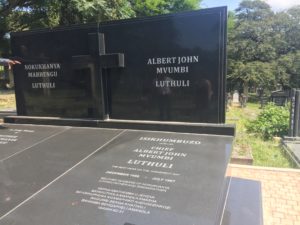
Chief Luthuli died in 1967 while he was still serving as ANC president. Though the formal report on his death states that he was hit by a train near his home, both the autopsy of the body and context of his death suggest that story to be unlikely. There continue to be calls to re-examine his cause of death as many believe that it was a planned attack by the Apartheid government.
Today, Chief Luthuli is regarded as one of the key contributors to South African democracy. He advocated for a bill of rights and believed a constitutional court would uphold the ideals of the nation. Though he died before either were realised, his work paved the way for the ANC leaders who succeeded him. Today, the ANC headquarters in Johannesburg bears the name of Luthuli House in his honour.
By Admin
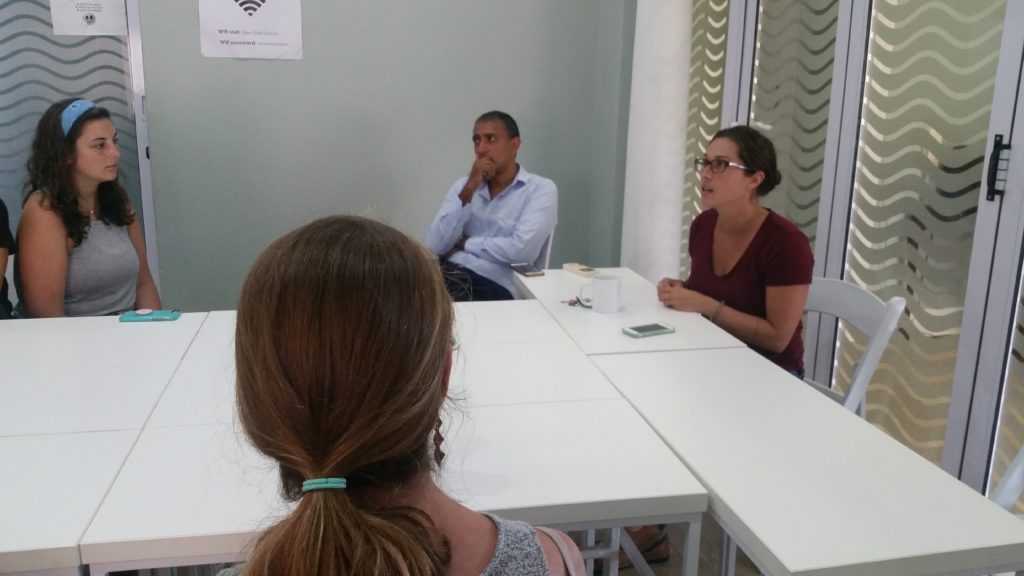
Image: Sophie McManus, Programme Lead (far right), meets with a group of students from the School for International Training (SIT).
By Hannah Green
What would happen if it was possible to text the government and receive a personal response? What changes would we see if community information was recorded and distributed in a more accessible manner? What would be the impact of teaching data analytics in school?
These are the types of social data questions the team at Open Data grapples with.
Open Data is a non-profit civic technology lab located in Durban. The organisation’s mission is to share knowledge in mediums and languages that are accessible to all citizens. They recognise that technology can play a role in connecting people and communicating important information. Their final products can take the form of graphics, websites, reports or workshops that share research results with local communities.
“What we start with isn’t a platform or a tool or a solution. We start with a problem. It starts from capturing user needs,” explained Sophie McManus, Programme Lead. She said that Open Data’s projects usually arise from concerns raised by the government, non-profit organizations, and the media or community members.
One of the team’s current projects, codenamed Durban Answers, is to revamp local government websites. McManus said that ordinary people found the current sites difficult to interact with and lacked information needed by the public.
“We are going to take all the information on government websites and turn it into a more usable format,” she explained. To do that, Open Data needs to collect information on what people want to know.
For this, Open Data uses methods like SMS polls but McManus also noted that technology excludes many South Africans.
“Many people have the problem of access to Internet or to data. They have, I believe the term is ‘dummy phones,’ that don’t have (web) access,” she said, “What we have found is that people who have access to technology and are comfortable using it are the people most likely to answer in our campaigns.”
As a result Open Data has taken information gathering offline, holding meetings and workshops for each project. Recently, the Durban Answers project team met with a range of people, from fishermen to businesspeople, to see “what information they need and how we can bring it to them,” according to McManus.
The team also holds workshop throughout the year to engage techies and non-techies alike. Their monthly meet-ups feature guest speakers, hackathons and collaborations on projects. McManus said that this promotes Open Data’s mission to be accessible to all South Africans.
You can read more about Open Data, explore their meet-up schedule and share project ideas with the organisation here.
By Admin
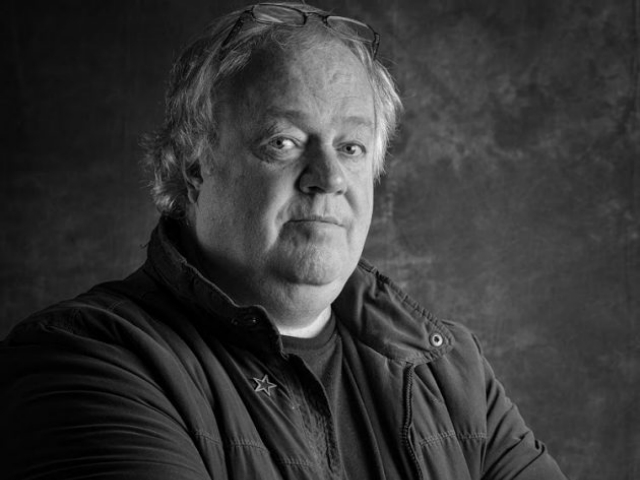
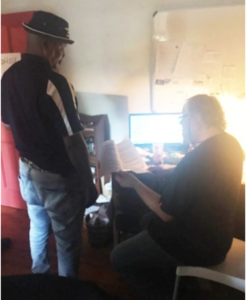
On Wednesday afternoon, Jacques Pauw, South African author of the book, The President’s Keepers which examines former president Jacob Zuma’s years in office, had his home raided by three members of the Hawks police unit. The raid received widespread news coverage in local media and prompted criticism from media freedom lobbyists. The South African National Editors Forum has said it will request a meeting with new police minister Bheki Cele to protest the raid. After obtaining a search warrant from a Cape Town magistrate, the officers arrived at Pauw’s home looking for documents. The search relates to charges laid against Pauw by the country’s State Security Agency (SSA). Pauw cooperated with the police.
By Admin
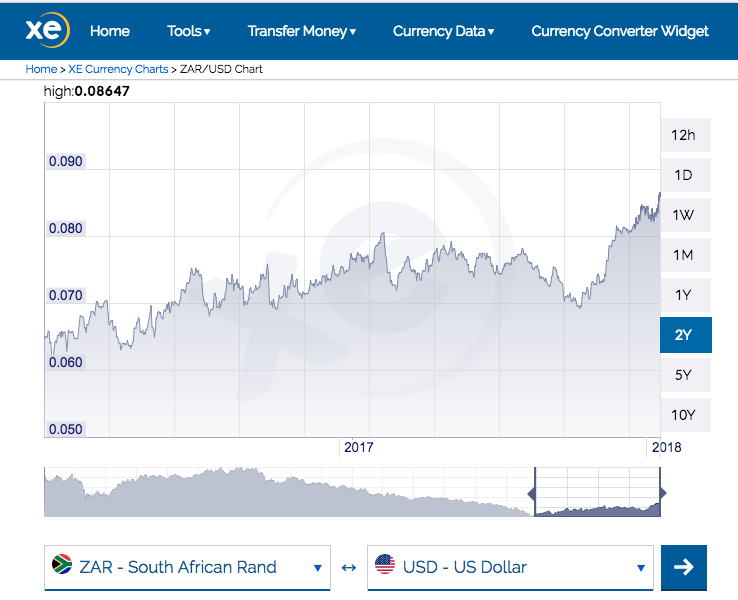
Main image: Currency tracker website xe.com provides a graphic representation of the upward movement of the rand in recent months.
By: Kamilah Tom
DURBAN – Following the resignation of Jacob Zuma as South Africa’s president and the swearing in of Cyril Ramaphosa as the country’s new head of state, the rand on Friday reached its strongest level in three years.
The dramatic gain, at one point reaching R11.50 to the US dollar, followed the appointment of the new president on Thursday evening, when the former trade unionist turned businessman was sworn into office.
President Ramaphosa, 65, has promised to fight to undo the corruption that the country has endured while under Zuma’s leadership and to gain the confidence of foreign investors by repairing the country’s failing state-owned entities.
The rand is expected to continue to rise following Ramaphosa’s delivery of the State of the Nation Address this evening. The government has indicated that the country’s 2018 Budget speech will be delivered in parliament next week.
By Admin
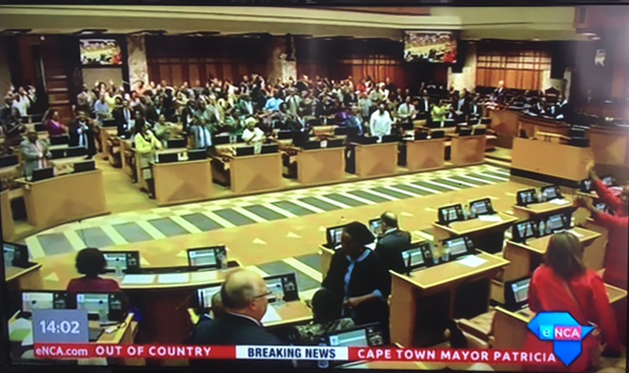
Main Photo: MPs seen on South African TV channel, eNCA, shortly before the parliamentary session was set to begin this afternoon.
Following President Jacob Zuma’s resignation last night, South Africa was today waiting for parliament to elect the country’s next leader. Deputy President Cyril Ramaphosa took over as the acting president of South Africa immediately after Zuma’s resignation. He was expected to be officially elected as the new president of South Africa in parliament this afternoon.
Ramaphosa has been deputy president of South Africa since 2014, and president of the ruling party since December 2017 when he won a succession battle against Jacob Zuma’s former wife, Nkosazana Dlamini-Zuma.
The presidential election this afternoon will replace a vote of no confidence that had been scheduled to be held in parliament today. The vote of no confidence motion was proposed by the opposition EFF, the Economic Freedom Fighters, who also called for the dissolution of parliament and for new national elections.
Prior to last night’s late-night resignation, the ANC parliamentary caucus had agreed that they would use their political majority to force him out in the EFF’s vote of no confidence. By resigning before the midnight deadline his party had given him, Zuma prevented the opposition from claiming victory for his departure.
Many South Africans have taken to social media to welcome Zuma’s resignation but some, particularly in Zuma’s home province of Kwazulu-Natal, have expressed unhappiness.
Zuma’s resignation comes after months of allegations of corruption against him. During his nine years as president of South Africa, allegations piled up accusing him of permitting the wealthy Gupta family to have undue influence over decisions of government, and of allowing inappropriate state spending on his personal home.
Even as Zuma offered his resignation, he remained adamant that he had done nothing wrong, and that the ANC had treated him unfairly by failing to tell him what they thought he had done wrong.
“I serve in my capacity as President of the Republic of South Africa within the prism of our much acclaimed Constitution, whose foundational values I fully subscribe to,” Zuma said during his resignation speech last night.
Ramaphosa is expected to deliver the State of the Nation address on Friday when he will speak to his vision for South Africa’s future.
UPDATE: February 15, 5:04 p.m. Cyril Ramaphosa was elected this afternoon as the president of South Africa. He was sworn in following the vote and will deliver the State of the Nation Address on Friday.
By Admin
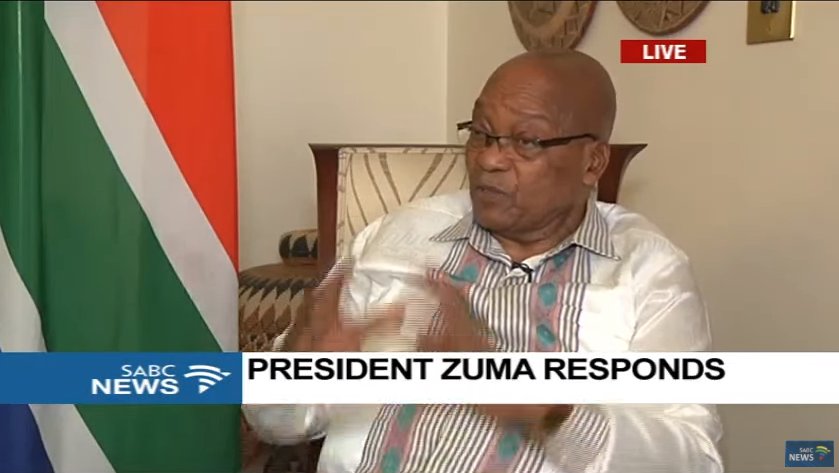
Main image: President Jacob Zuma seen during an interview live-streamed on the national broadcaster, in which he said he felt he had been unfairly treated.
By Hannah Green
South Africans were glued to news networks today as the ruling African National Congress party issued President Jacob Zuma a formal recall and an ultimatum: resign by the end of today, or face a vote of no confidence in Parliament tomorrow.
This comes after weeks of internal dialogue in the ANC about removing Zuma from office. This prolonged uncertainty has left many South Africans eager to see a resolution, and to finally reclaim sleep lost following several nights of standing by for news.
“#ZumaExit stole hours of sleep and anticipation from me! I feel like I am binge watching a reality show…a really bad reality show,” reads a tweet by @uncleIsaiah16.
“Can’t eat, can’t sleep. TV analists [sic] go on & on. We need & deserve closure & a country we can survive in,” writes @SowterTracy.
President Zuma was expected to hold a media briefing at 10 a.m. today, but this did not materialize. Instead the president held an unannounced television interview with a single journalist on the public broadcaster, during which he said he disagreed with his party’s decision to request him to resign with immediate effect and insisted he had been provided with no reasons for his recall.
A further statement from the president was expected to be delivered before the midnight deadline.
By Admin
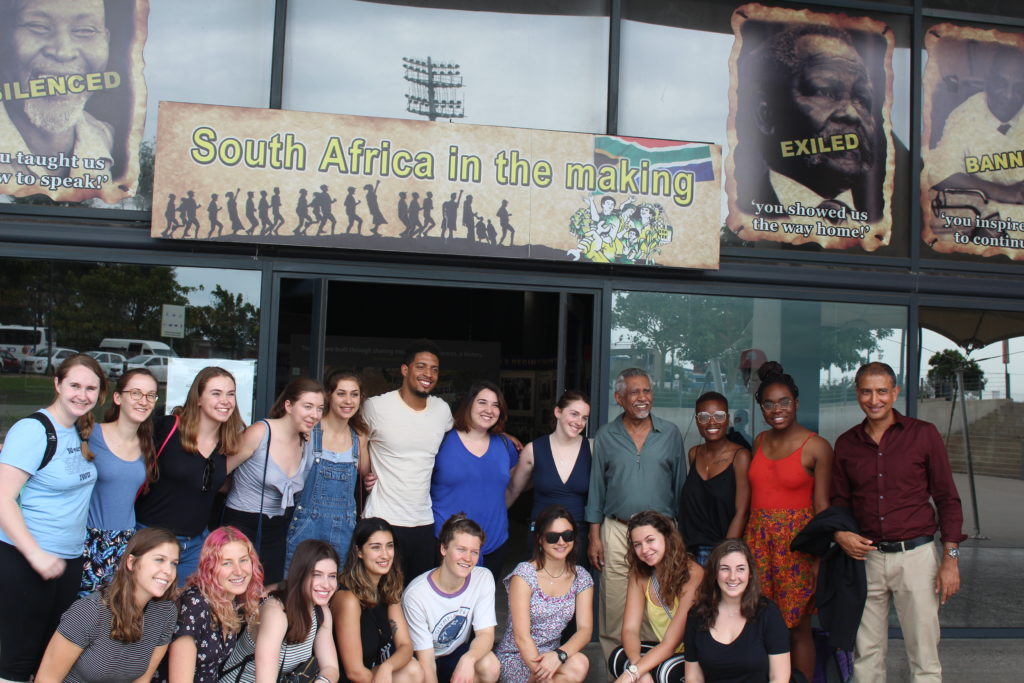
Today, our program had the privilege of meeting and speaking with Mac Maharaj, admired as one of the fathers of democratic South Africa and a man who was a great friend of Nelson Mandela.
Mr Maharaj and Mr Mandela were fellow inmates on the notorious Robben Island where political prisoners were incarcerated by the Apartheid government.
In an inspiring session, Mr Maharaj engaged us with stories of life on the Island and his many years as a leader of the Underground struggle to end Apartheid. He gave us insights into a range of key historical and contemporary political events in the country, and shared his perspective on global issues, past and present.
Our encounter with this iconic figure took place inside an exhibition space at the Moses Mabhida Stadium in downtown Durban, where an exhibition entitled South Africa in the Making traces the history of the anti-Apartheid struggle in photographs. An audio guide featuring music of resistance and descriptions of events during the Struggle accompanied photographs of key players and moments that helped bring an end to Apartheid. The poignant exhibition challenged us to understand the trajectory of South Africa’s path to democracy.
Mr Maharaj left us with words of hope and action. He told us he hoped that the challenges of globalization, growing global inequality, and the impact of climate change would motivate once-disparate communities to find a way to work together. It was his hope that these issues would bring communities together and allow them to push past their differences to pave the way for a more united, equal, and free tomorrow.
Read more about the exhibit here, and more about Mr. Maharaj here.
By Admin
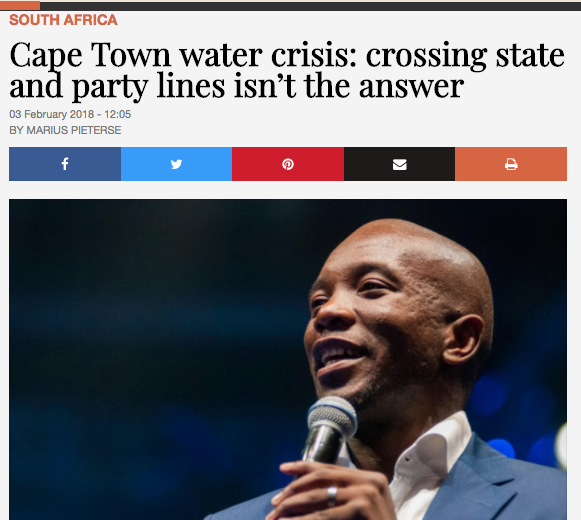
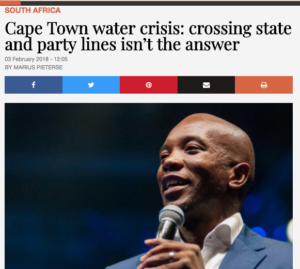
By Hannah Green
Cape Town Mayor Patricia De Lille, Democratic Alliance (DA), has been stripped of her responsibilities for her ineffective response to the city’s water crisis. This comes at a critical moment for the DA, which just recently overcame years of minimal political representation to gain power in the Western Cape Province.
In response to De Lille’s removal, the DA political party has taken over the city’s water task force. While this article addresses the constitutional implications of a political party stepping in to govern in place of an elected official, this crisis also has severe implications for the DA.
In a class discussion with Nicole Graham, DA Councillor and Deputy Leader, she explained how this removal could affect the party’s future. The DA is drawing criticism for removing the popular De Lille, which could reduce votes for the party in the Western Cape — the only province they have been able to capture since the party’s formation in 2000. After collecting approximately 22% of the vote in the last national election, Graham said this crisis could contribute to a decline in votes for the DA, hurting their role as the nation’s main opposition party.
1 Kipling Road • Brattleboro, VT 05302 • 802 257-7751 • 800 257-7751 (toll-free in the US)
SIT is a private nonprofit institution of higher education.
© Copyright World Learning, Inc.



